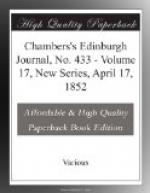Delays were needless, for time could do nothing to smooth their path; so it was determined that Hyppolito should bring a ladder to Dianora’s window, and, aided by their friend, they should find their way to a priest prepared to give them his blessing. The night appointed came—still and beautiful as heart could wish; the stars sparkling in the deep blue sky, bright as they may now be seen in that fair clime. Hyppolito has reached the house; he has fixed the ladder of ropes; there is no moon to betray him; in a minute, his light step will have reached the balcony. But there is a noise in the street, and lights approaching; the night-guard is passing; they have seen the ladder, for the street is narrow. Hyppolito is down, and tries to escape—in vain. They seize and drag him to prison. What was he doing there? What can he reply? That he meant to enter the house, to carry something from it, or commit some bad deed, cannot be denied. He will not betray Dianora; it would only be to separate them for ever, and leave her with a stained name. He yields to his fate; the proofs are irresistible, and, by the severe law of Florence at that period, Hyppolito must die. All Florence is in amazement. So estimable a youth, to all outward appearance, to be in reality addicted to the basest crimes! Who could have believed it? But he confesses; there is no room for doubt. Pardon is implored by his afflicted friends; but no pardon can be granted for so flagrant a crime.
Hyppolito had one consolation—his father never doubted him; if he had, one glance of his son’s clear though sad eye, and candid, open brow, would have reassured him. He saw there was a mystery, but he was sure it involved no guilt on Hyppolito’s part. Hyppolito also believed that his good name would one day be cleared, and that his noble Dianora would in due time remove the stain that clouded it. He consented to die, rather than live separated from her. Yet poor Hyppolito was sorry to leave the world so young; and sadly, though calmly, he arranged his small possessions, for the benefit of those he loved, and of the poor, to whom he had always been a friend.




